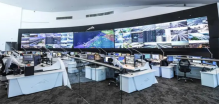In addition to prohibiting states from setting its own governing rules, the new legislation would also block federal regulators from demanding pre-market approval for autonomous vehicle technology. The US House Republican proposal hasn't been formally tabled yet, and whilst it's still a considerable distance from being introduced as a new law - industry analysts have claimed it represents a huge victory for companies such as Tesla, Uber, General Motors Co and other automakers that plan to continue to invest hugely in the development of self-driving technology and autonomous vehicles.
The aforementioned companies previously expressed their concerns to representatives of Trumps' administration and attempted to persuade Congress to pre-empt rules under consideration in California, New York and other states that could limit the deployment of self-driving vehicles. Industry leaders also vehemently opposed a proposal tabled by the Obama administration last year that raised the possibility of allowing regulators the power to review and approve self-driving technology before it was put into service. This mirrored the vetting process which is adopted by the Federal Aviation Administration of new technology for aircraft.
The extensive legislation consists of 45 pages and 14 bills which would designate the US National Highway Traffic Safety Administration as the lead agency for regulating self-driving cars, pre-empting state rules. However, it has been reported that states could still establish its own insurance and registration rules but could not implement them in a way to regulate self-driving technologies. California has already proposed changes to its own self-driving car rules, but automakers suggested the changes had not gone far enough and expressed its dissatisfaction back in April when state authorities in California made the announcement.
One of the bills within the proposal would enable the US Transportation Department to exempt up to 100,000 vehicles per-year from US federal motor vehicle safety rules. Current practice prevents the sale of self-driving vehicles without steering wheels, pedals and other human controls. One other interesting aspect within the legislation is the proposal in relation to crash data, testing and validation reports from automated cars - which are subsequently provided to US regulators will be termed as ‘confidential business information'.
U.S. Representative Bob Latta, who chairs a key panel overseeing automobile regulation, called the draft legislation "an important step in establishing a framework to allow innovators to safely develop and test autonomous vehicles." He said Republicans want "to continue working with all parties in a bipartisan manner as we refine language and move towards a consensus package."


















